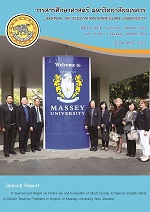ศาสตร์ด้านหลักสูตร: การบรรจบกันของโลกาภิวัตน์ อุดมการณ์ทางการศึกษา และสหวิทยาการทางมนุษยศาสตร์และสังคมศาสตร์
Main Article Content
Abstract
บทคัดย่อ
บทความฉบับนี้มีวัตถุประสงค์เพื่อนำเสนอสถานภาพของศาสตร์ด้านหลักสูตรที่ได้รับการประกอบสร้างขึ้นภายใต้บริบททางสังคม วัฒนธรรม การเมืองและประวัติศาสตร์ในยุคโลกาภิวัตน์ รวมถึงอุดมการณ์ทางการศึกษา และสหวิทยาการทางมนุษยศาสตร์และสังคมศาสตร์ สาระสำคัญของบทความเกี่ยวข้องกับนิยามของหลักสูตรที่มิใช่เทคนิควิธีการทางวิทยาศาสตร์ตามกระบวนทัศน์ปฏิฐานนิยม หากแต่หลักสูตรมีลักษณะเชิงปรัชญา เกี่ยวกับปัจเจกบุคคล และกระบวนการไตร่ตรองอย่างลึกซึ้ง วาทกรรมหลักสูตรดังกล่าวได้รับอิทธิพลจากนักการศึกษา/นักวิชาการด้านหลักสูตร เช่น Elliot Eisner, Henry Giroux, Peter McLaren, William Reid, Maxine Greene, Michael Apple และ William Pinar นักการศึกษาเหล่านี้มองว่า โลกใบนี้เต็มไปด้วยความละเอียดอ่อนซับซ้อน การรับรู้ของบุคคลจึงมีความงาม เป็นพลวัต เป็นการรับรู้ที่อยู่เหนือความคิด และเป็นพฤติกรรมในระดับบุคคล ดังนั้นหลักสูตรจึงมีวิวัฒนาการเฉกเช่นเดียวกับสิ่งมีชีวิตที่ไม่สามารถวางแผนควบคุมไว้ล่วงหน้าได้ ซึ่งต่างกับเครื่องจักรกลที่สามารถควบคุมได้ด้วยกระบวนการที่มีระบบระเบียบแบบวิทยาศาสตร์
วาทกรรมหลักสูตรเกิดการเปลี่ยนแปลงจากการให้ความสำคัญกับการวางแผนหลักสูตร การพัฒนาหลักสูตร การนำหลักสูตรไปใช้ และการประเมินผลหลักสูตรไปสู่การศึกษาประสบการณ์ทางการศึกษาที่มีความละเอียดอ่อน ลึกซึ้ง เน้นการทำความเข้าใจอย่างใคร่ครวญ สาระสำคัญดังกล่าวนับว่าเป็นนัยสำคัญสำหรับนักการศึกษา/นักวิชาการด้านหลักสูตรที่จะต้องก้าวผ่านมิติการพัฒนาหลักสูตรแบบเดิมไปสู่การปฏิรูปนิยามใหม่ให้แก่ศาสตร์หลักสูตร เพื่อที่จะให้อุดมการณ์ประชาธิปไตย ความเสมอภาค และความยุติธรรมในสังคมมนุษย์เกิดขึ้นอย่างแท้จริง
คำสำคัญ: วาทกรรมหลักสูตร/ การศึกษาแนวปฏิรูป/ กระบวนทัศน์ทางการศึกษาเชิงวิพากษ์และหลังสมัยใหม่นิยม
Abstract
The article aimed at presenting the current status of curriculum studies which was constructed through the socio-cultural, political and historical contexts of globalization, educational ideology, and the convergence of the Humanities and the Social Sciences. The main arguments in this article concern a wider conception of curriculum as non-technical and more philosophical, personal, and deliberative approaches. The discourses on curriculum were influenced by educational and curriculum scholars like Elliot Eisner, Henry Giroux, Peter McLaren, William Reid, Maxine Greene, Michael Apple, and William Pinar. These scholars believed that the world is much more complex, involving subjective, personal, aesthetic, transactional, and intuitive forms of thinking and behavior. Therefore, curriculum evolves as a living organism as opposed to machine which is precise and orderly - it cannot be precisely planned.
The discourses are no longer to provide traditional/technical-scientific curriculum planning, development, implementation and evaluation. Rather, the interrogation and deconstruction of the curricular discourses of the past towards deeper and more critical understanding are emphasized. The imperative for those of us engaged in curriculum studies is to re-conceptualize the curriculum field so that ideals such as democracy, equity and social justice become increasingly the daily lived experienced of learners and teachers.
Key words: Curriculum discourses/ Re-conceptualist/ Critical and Postmodern paradigm
Article Details
The owner of the article does not copy or violate any of its copyright. If any copyright infringement occurs or prosecution, in any case, the Editorial Board is not involved in all the rights to the owner of the article to be performed.


